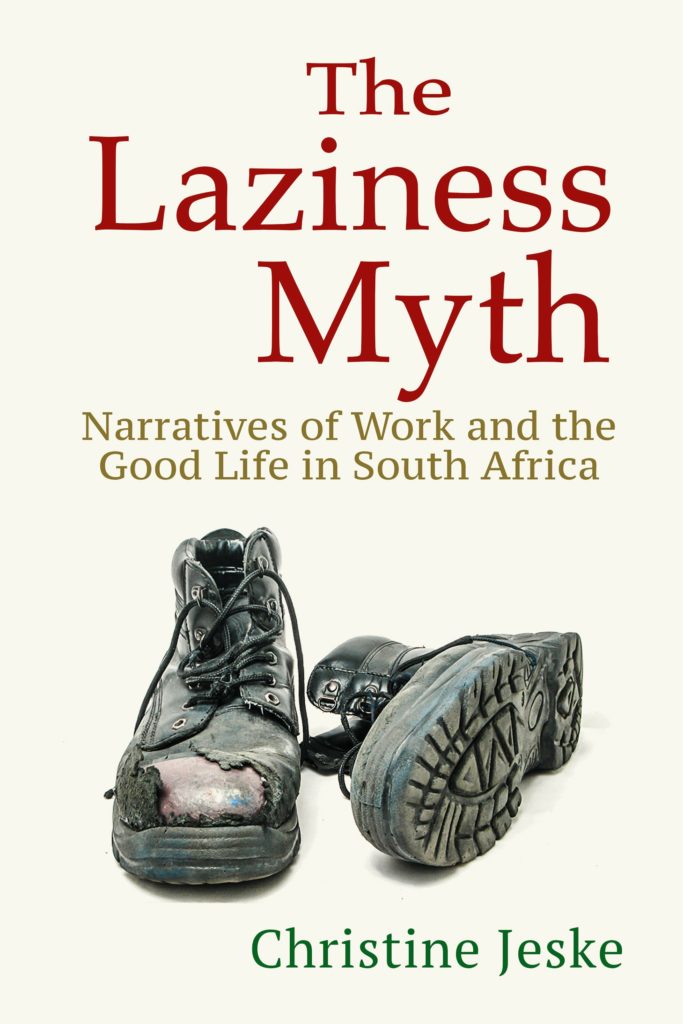
When people cannot find good work, can they still find good lives? By investigating this question in the context of South Africa, where only 43 percent of adults are employed, Christine Jeske invites readers to examine their own assumptions about how work and the good life do or do not coincide. The Laziness Myth challenges the widespread premise that hard work determines success by tracing the “laziness myth,” a persistent narrative that disguises the systems and structures that produce inequalities while blaming unemployment and other social ills on the so-called laziness of particular class, racial, and ethnic groups.
Jeske offers evidence of the laziness myth’s harsh consequences, as well as insights into how to challenge it with other South African narratives of a good life. In contexts as diverse as rapping in a library, manufacturing leather shoes, weed-whacking neighbors’ yards, negotiating marriage plans, and sharing water taps, the people described in this book will stimulate discussion on creative possibilities for seeking the good life in and out of employment, in South Africa and elsewhere.
Praise for The Laziness Myth
“With evidence of extensive fieldwork, research and reflection, Christine Jeske shows how variously situated individuals relate work to the good life, the challenges some face in attaining it through work, and how they find the good life anyway. She excels at storytelling, setting vivid scenes that keep her book lively and relatable.”
– James Chamberlain, Mississippi State University, author of Undoing Work, Rethinking Community
“This engaging, nuanced, and thought-provoking book does an excellent job introducing complex concepts in clear, accessible ways. Christine Jeske makes a persuasive case about the ways in which hard work is not working for South African youth (and others). A pleasure to read.”
– Carrie Lane, California State University, author of A Company of One
“In South Africa and far beyond, the dogma that “hard work” will lead to a “proper job” and a satisfying life is turning out to be a cruel myth for many. But at the same time, new visions of what a “good life” really is (and how one might achieve it) are starting to emerge. Christine Jeske, a gifted writer and subtle listener, is a superb guide to these new visions, and to the lives that are beginning to be imagined and lived in their terms. Lucidly presented and full of engaging ethnographic detail, this book should see wide use, including in classrooms.”
– James Ferguson, Stanford University, author of Give a Man a Fish
“The Laziness Myth is engaging, and its methodology and analysis makes a valuable and timely contribution to studies of poverty, unemployment and inequality in South Africa and the Global South. The book systematically confronts dominant narratives about unemployment and poverty by exploring counter narratives of poor South Africans with great detail and care.”
– Sarah Mosoetsa, Associate Professor of Sociology, University of the Witwatersrand, author of Eating From One Pot

About the Author
Christine Jeske is an Associate Professor of Cultural Anthropology at Wheaton College and author of several books. She received her Ph.D. from the University of Wisconsin–Madison and has worked in microfinance, refugee resettlement, community development, and teaching while living in Nicaragua, China, and South Africa. Her current research considers how people imagine achieving a “good life,” especially when unemployed or working in low-wage jobs. She lives in an old Wisconsin farmhouse named the Sanctuary, complete with a dozen chickens, several pigs, innumerable weeds, two children, and one wonderful husband.
